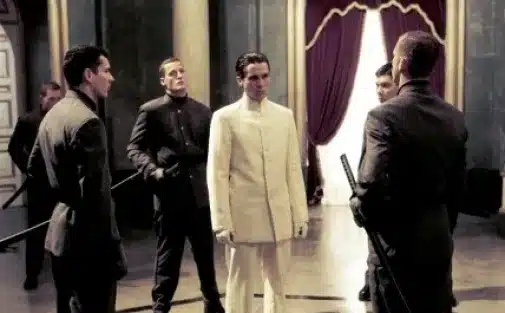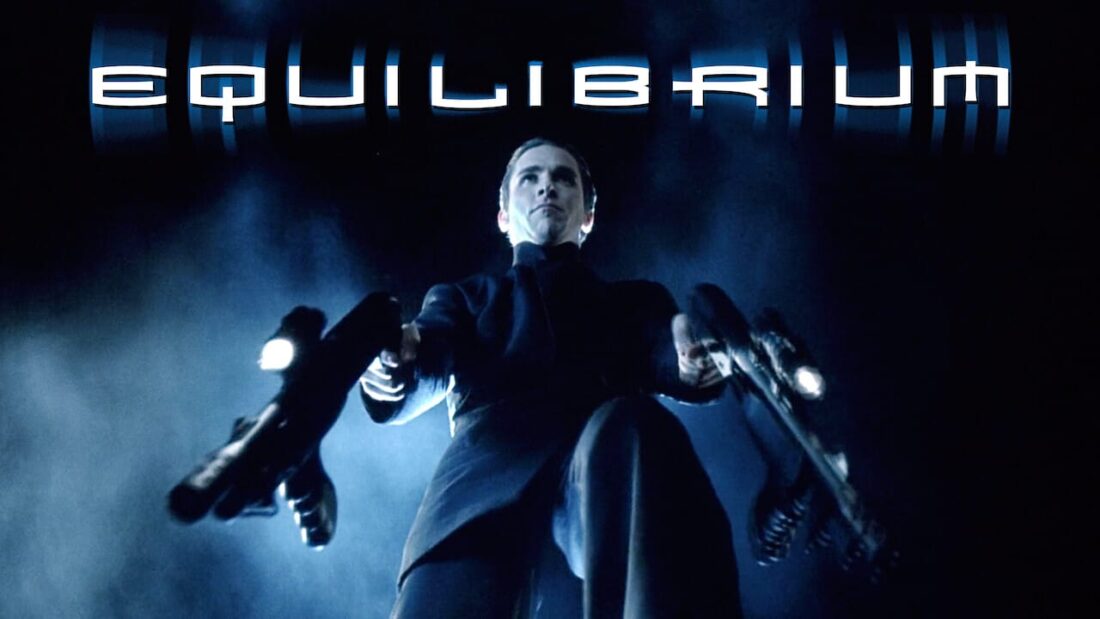Kurt Wimmer’s 2002 action-thriller Equilibrium, a fusion of Nineteen Eighty-Four with futuristic elements, gun kata, and Matrix-like graphics, recreates an exciting synthesis. The novel takes place in a dystopian future in which dictatorship and tyranny overtake the post-Planet War III world. All emotions are forbidden in the new Father-ruled state of Libria, just like the things that can arouse them, including art or music. John Preston, a high-ranking Grammaton cleric who is intended to uphold the dictatorship but begins to feel, is the main character of the film. Spoilers follow as we break down the Equilibrium movie’s narrative.

Oh, and if this post didn’t cover all of your questions, leave a comment here or send me a message on Facebook chat, and I’ll get back to you. Using the site’s search bar at the top, you can locate more film analysis.
Errol Partridge| Who Is He?
Equilibrium begins with a Cleric attack on the Underground, a rebel group. Errol discreetly preserves one book, The Poetry of William Butler Yeats, while Preston and his partner Partridge destroy illicit artwork and books. At this point, we comprehend how he is feeling.
A short while later, when he discovers his buddy reading the book in an abandoned chapel, Preston murders him for a senseless crime. Partridge reads him one of the poems in his dying moments before raising the book to protect himself. Partridge employs literature as his final defence, claims a top paper writer from essay assistance service, a platform for student academic writing. He is willing to die for his convictions and stands by them. His final words are taken from a poem:
I would spread the clothes down beneath your feet, but I am poor and all I have are my fantasies, which I have already done.
You are walking on my dreams, so step carefully.

The movie will use these phrases once more, and Preston will match Partridge’s actions in a similar moment as he grabs a book from a different raid and keeps it for himself. Preston’s development is changed by Partridge’s readiness to die for his beliefs.
John Preston: Who Is He?
We learn very little about Preston’s past through the novel. He isn’t even supposed to have one, in reality. His service is his life. Preston is a Grammaton Cleric, a member of an elite branch of law enforcement that conducts clean-up operations to get rid of any emotional outbursts in Libria.
Preston excels in it. He is a flawless Tetragrammaton Council soldier who can detect when someone is beginning to sense emotions and commits no errors. Ironically, it is his steely composure and expertise in serving the dictatorship that bring about its downfall.
Preston has a choice in whether or not to experience emotion. Obviously, living without them is simpler. But the loss of freedom and human rights comes along with this ease and pleasure. The system establishes the laws, but each individual chooses whether or not to abide by them. Either you choose to be complicit and lose sight of your humanity, or you choose to stand up for what you believe in and demand justice. This is how Equilibrium compares authoritarianism in the real world to a society that is ready (or not) to resist.

Prozium II- What Is It?
The Third World War’s carnage and destruction provided the Librian government with justification to outlaw all human emotions. All citizens should self-administer the psychoactive medication Prozium II to stop this root of interpersonal violence and hatred.
Naturally, it also removes joy and compassion along with removing rage, fear, and grief. People eventually lose the ability to love or be friends. Their lives are lived in slavish submission to the state. The regime declares war on its people and their inherent humanity by pretending to put an end to wars.
Mechanization of Society in a State of Balance
The Government in Equilibrium seeks to transform individuals into emotionless machines that are powerless to rebel against the philosophy being imposed upon them. This human mind and body mechanisation serves as a tool. People become estranged from one another and more susceptible to manipulation when they lack emotions. While the sensation of complete tranquilly and “balance” may be desired, it robs people of the emotions associated with being alive.
People in Libria have a uniform appearance. They have emotionless facial expressions and simple, dark clothes, which resemble those worn by living robots. They cease to be objects. The people of Libria are “something,” not “someone,” with no inner life, no desires, and no loves.
What Is the Equilibrium Mise-en-Scène?
Codes and hidden meanings abound in Equilibrium’s set design. In the first scene of the film, Preston and Partridge are participating in a raid against the resistance. The background consists of wrecked and abandoned buildings where the resistance members strive to conceal the artefacts of the pre-apocalyptic world, such as books, paintings, record players, and small, aesthetically pleasing trinkets.

However, the regime seeks to eliminate anything that could arouse emotion in a person. Under the floorboards, we discover the Mona Lisa, a Renaissance masterpiece. As the painting is set ablaze and Mona Lisa smiles through fire as a representation of invincibility, even the pace of the film slows down at this time.
A deserted church is yet another symbol. The once-sacred and safe emblem of faith has lost its sacredness. The fact that Preston kills his buddy here demonstrates how thoroughly society has degraded and dehumanised people.
Kurt Wimmer conveys sensory information through context, colour, and item arrangement. The workplaces, streets, and residential structures in Libria are all the same, despite the struggle preserving items like prohibited antique mirror frames and photographs. Everything appears impersonal and sterile. The colours are so muted that the picture almost has a black-and-white appearance. The arrangement of the things within the frame of the shot is consistent and perfectly symmetrical, based on right angles. This expresses the atmosphere of rigidity, uniformity, and absolute control that permeates Libria.
What Viviana Preston Does
The scene where DuPond interrogates Preston about his wife’s incarceration demonstrates that he had been feeling things long before stopping the Prozium injections. Once more, the film expresses their love for one another through the language of light and colour.
A contrasting reminiscence enters the picture as DuPont reminds Preston of Viviana. The woman is detained in this case for violating the senses. Her presence alone causes the world in his recollection to become more vivid and colourful, which is distinctive about this experience. It demonstrates that Preston was capable of loving despite being oppressed. Despite Prozium’s suppression of his emotions, which prevented him from openly grieving Viviana’s passing, this tragedy unintentionally led him to begin doubting his convictions.

Expressions of Preston’s Feelings
Preston’s genuine change begins when he spills a vial while administering an injection and misses a shot. He begins to have dreams and feel things. Preston needs to reclaim his own sense of beauty. For the first time in years, the character breaks the film on his window and witnesses a rainbow and the rising sun. He takes off his glow before leaving for work so that he can feel the surroundings. Even the feel of a stair railing beneath his hand is novel and intriguing.
Without drugs, Preston begins to see oppression everywhere. The items on his coworkers’ workstations are identical and are set up in the same locations on each Cleric’s desk. Preston is expressing his displeasure by rearranging the stationery on his desk.
What Mary O’Brien Means| What Is It?
When Preston first meets Mary O’Brien, it is one of the movie’s key moments. She is a sense offender much like his wife Viviana, and just like her, she will be put to death, or as the Tetragrammaton Council would say, “processed.” Preston is affected emotionally by Mary. She questions his beliefs as he is being questioned, such as what he lives for and whether he understands what a friend is.
But Mary plays a considerably bigger part in Preston’s life. Her entry into his life gives him a second chance to love and act morally. In contrast to what he did for Viviana, he attempts to save Mary and halt the execution. Even though it’s too late, Preston changes from wicked to good with Mary’s ribbon in his grasp.

Who Is Father, a movie about equilibrium? Is He Feeling?
A brilliant leader is little more than an image, as is customary in authoritarian systems. Father is a creation of propaganda, a fictional representation of God. Despite being long dead, his picture was utilised to broadcast propaganda throughout Libria by manipulating the images on the screens.
But there is one very real individual who holds all the power. DuPont, Father’s vice-counsel, is filled with resentment, rage, and self-indulgence. He represents the dictatorial elite in typical fashion. someone who publishes false information solely for control and power.
Understanding DuPont also requires understanding the context. His office boasts brilliant walls, thick red curtains, artwork, Tuscan columns, and antique furniture, whereas the entirety of Libria is doomed to be a dismal and colourless place. He experiences feelings and indulges in all forbidden pleasures.
Movie Equilibrium| Defining the Resolution
Equilibrium’s climax shows that DuPont has assumed the role of Father and has duped Preston into revealing the Underground. Preston engages Brandt in combat, kills him, then pursues DuPont. Preston assassinates DuPont in the epilogue, revealing Father’s propaganda. The destruction of the Prozium plants will restore feeling to the planet. Even if the movie concludes on a happy note, conflict will inevitably break out between humanity since they are just that way.
Movie Equilibrium| Closing Remarks
The reviews of Equilibrium from the critics were fairly conflicting. Its excessive dependence on prior dystopian works and lack of a unique message have drawn criticism from some. However, it “would be a dumb action picture, except that it has a thought,” as Roger Ebert observed. Its intricate plot and set design deliver a potent message.
Additionally, as crises follow crises in the real world, dystopian films like Equilibrium take on new meanings and become more timely. Despite being underestimated, the movie is nonetheless worth viewing. You get another chance to admire Christian Bale’s superb performance in this action-packed, symbolic film.
What did you think of the movie Equilibrium’s story and climax? Post a comment down below!
ALSO READ THIS: What Was It About, The Fountain?
